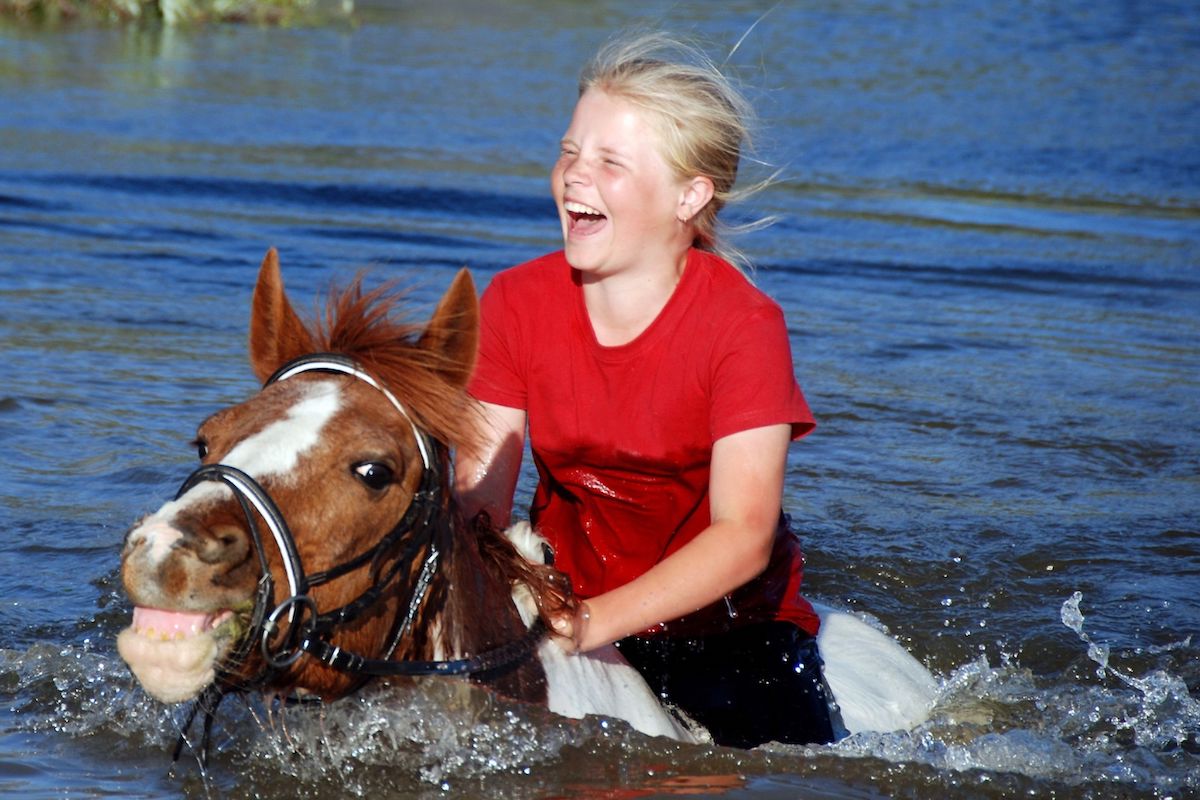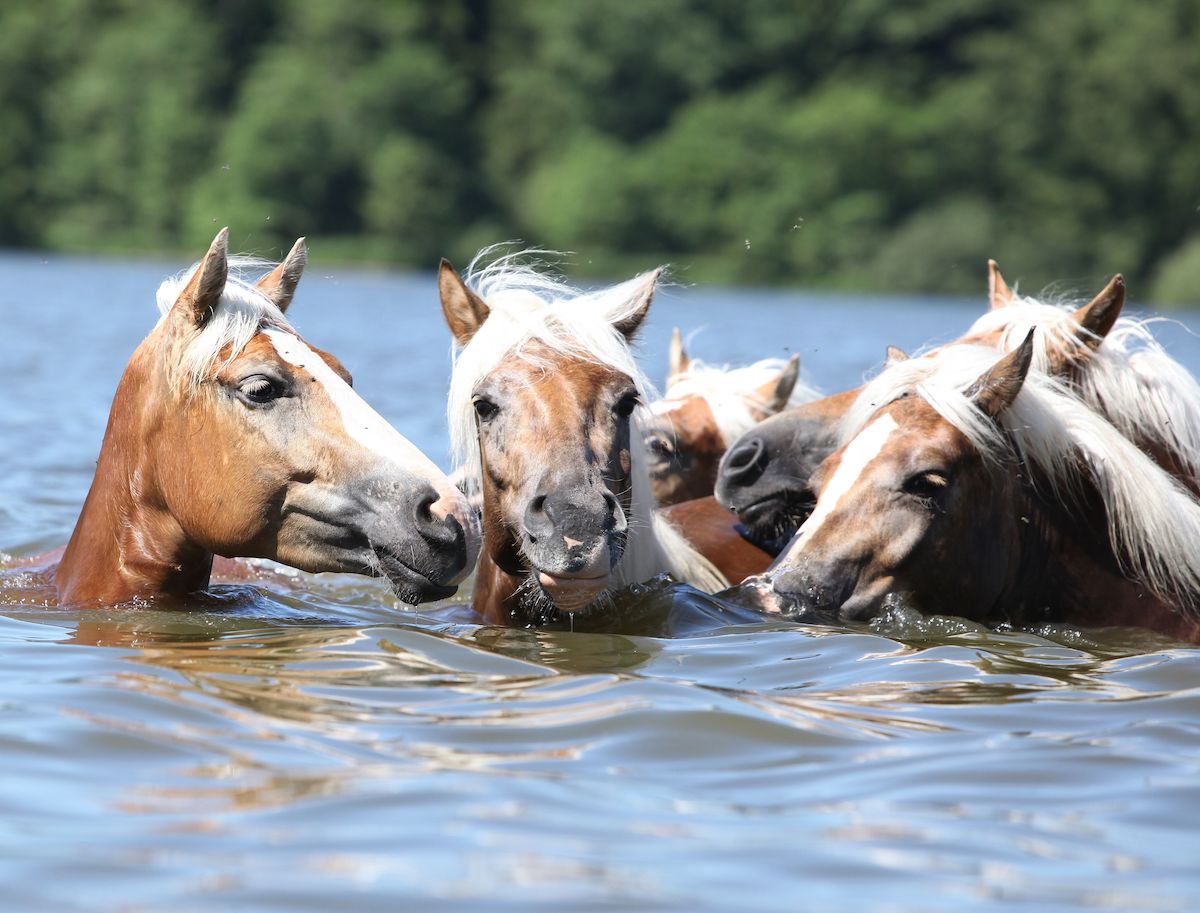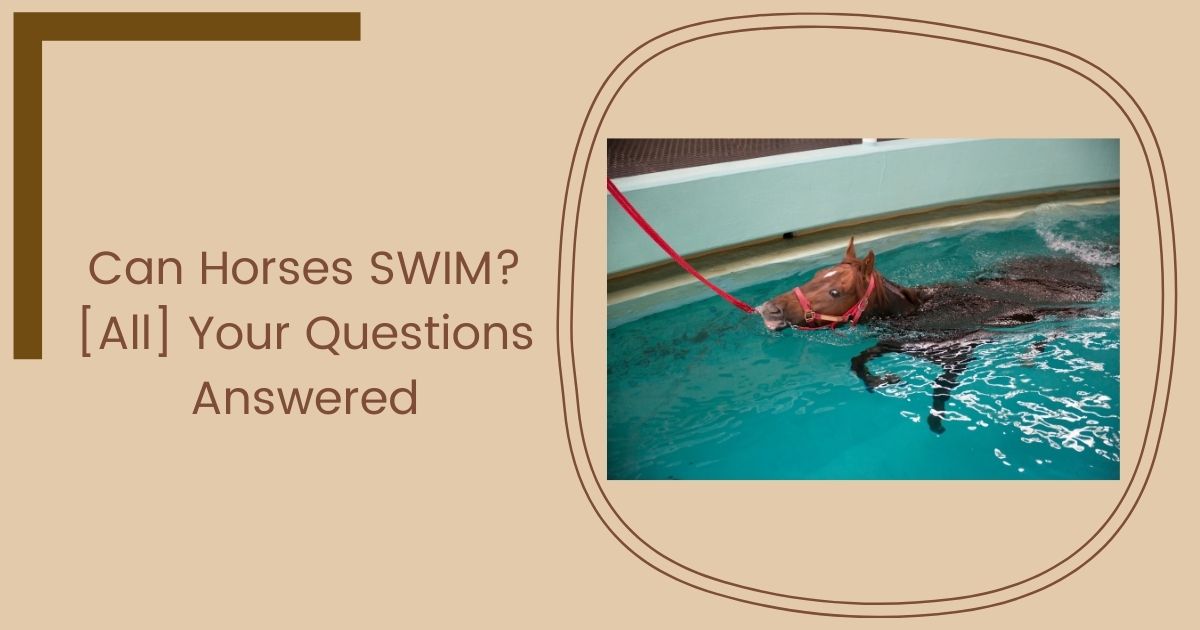Can Horses Swim and Other Things You Need to Know
Would you be able to answer if somebody asks a random question like, “Can horses swim? If you can answer correctly with confidence, well done. If you are unsure, that is okay! We are here to help.
Have a read through this article, and you will get your answer and supportive information, so you will be ready the next time you get asked the question.
First things first, yes, horses can swim.
How do Horses Swim?
Horses use their four limbs and move them in a trotting/paddling motion while keeping the head above the water.
They generally would not submerge their head, and if they do, that would not be for a long period of time as they are incapable of holding their breath underwater. Therefore, Breathe-holding is not a technique that you can teach your horse.

Why do Horses Swim?
All modern domestic horses belong to an ancestor horse species that lived in the wild. They were foragers/grazers that used to migrate in search of food. Along their journey, they would come across rivers that would require them to swim to cross to the other side for food or to escape danger.
Their natural instinct to swim has been passed down from the ancestors to their descendants.
Although domesticated horses would unlikely need to swim for the same reasons as their ancestors, they can still swim if they find themselves in an ‘un-walkable’ depth of water.
Reasons domesticated horses may go into deep water can be recreational, therapeutic, educational, or fight-or-flight response.
Do Horses Like to Swim? And Why They are Fascinated With Water
Some horses seem to enjoy swimming while other horses do not. It depends on their experience and abilities. You cannot expect all to have the same attitude or feeling towards water.
Horses have a wide pupillary distance; in other words, their eyes are set very far apart. Therefore, it can be challenging for them to judge the distance of objects. This physiological disadvantage of having a limited depth perception may trigger discomfort or fear, especially while in deep water where their hooves cannot reach the ground/bottom of the water.
Yet, they are naturally inquisitive animals. They may be intrigued by water and its characteristics, especially for those horses that have never been around the water. So you may see them staring at currents or testing the water by pawing on, sniffing, or having a little sip.
Horses with a history of swimming may react in a way that reflects their past experiences. For example, horses with positive aquatic experiences would be more comfortable/confident around the water. They may even show excitement, whereas horses with negative past experiences would likely be more hesitant or refuse to go near water.
Is it Possible to Ride a Horse That is Swimming?
It is possible for you to enjoy a horse-riding experience while your horse is swimming only if the horse is comfortable and can maintain its movement while you are on its back.
Basically, it is possible only if it is safe for both the rider and the horse.

The Benefits of Horses Swimming in Water
Swimming has various health benefits for horses.
It can be considered a recreational activity for those horses that enjoy being in the water. Swimming allows horses to have a unique experience that is not available on land. In addition, it is suggested to improve the horse’s mental wellbeing by providing stimulation enriched with calming and stress-relieving effects.
Swimming is often used as a form of physical exercise. In water, the body feels lighter, and weight is supported due to the buoyant force effect. This makes it easier for horses to move freely without the influence of their body weight and any associated pain or strain.
It, therefore, can help increase the range of motion within joints, muscle mass and strength, endurance, and flexibility.
Although, swimming is not recommended for horses with the following conditions:
- Respiratory disease
- Surgical incisions and open wounds
Respiratory disease
Lung volume decreases, and hydrostatic pressure increases as the body gets submerged in water. This can be detrimental to an already compromised respiratory system.
Surgical incision
Incision sites are considered open wounds until they are fully healed, which can take several weeks to months depending on their location and size, whether they are stitched closed or left open.
Wetting an incision or an open wound can cause swelling, softening of the skin and heighten the risk of infection.
How Fast and Deep Can a Horse Swim?
The strength/fitness level of the individual and the condition of the aquatic environment determine the maximum speed and depth that the horse can swim for. Some studies have reported that horses can swim at a top rate of 4km/hr (2.48 mph).
The fitter, your horse, is, the faster they can swim as they would be able to stroke/paddle stronger and more frequently than horses with low stamina levels. Also, a calm, low tide with slow-moving water is easier for horses than swimming in a rapid current of water where water resistance slows down the movement of horses.
Horses can float due to their enormous lungs that help with buoyancy, and they do not submerge any region above the neck. Therefore, they can swim comfortably in deep water where their hooves would not touch the ground.
How Long Can a Horse Swim For?
Similar to the previous question’s answer, a horse’s fitness level and the condition of the swimming environment determine how long they can swim.
Swimming is an energy-expensive activity. The amount of energy spent for 10-minute swimming is almost equal to several miles of cantering. Therefore, the fitter the horse is, the longer they will be able to swim. Also, calmer, flat water would require less energy to move through, and horses would be able to stay in water longer.
Is There a Difference in Horses Swimming in Fresh Water vs. Salt Water
Saltwater has a higher density than freshwater, making the horse’s body floats better in saltwater. Therefore horses may be able to swim longer and faster in bodies of saltwater.
10 Things to Ask Yourself Before Going Swimming With Horses
Although you would likely be on the back of your horse most of the time, you must be capable of swimming in on your own without any assistance.
There may be a situation where you get separated from your horse in deep water and you need to swim to get to safety on your own.
If you are not a confident swimmer, personal safety gear such as a life jacket must be worn. Also consider choosing shallow water where you can stand with your head and shoulders above the water, or water within a controlled environment (e.g. a pool facility designated for animals).
Check to see if your horse is both physically and mentally well enough to enter the water.
Horses with an open wound, a healing surgical site, or a respiratory disease are common physical conditions that make horses not ideal candidates for swimming. The exception may apply to horses with a healing surgical site if the incision site stays above the water and completely dry.
Fearful horses with a phobia or dislike of water should not be forced into swimming unless the benefits of them swimming outweigh the risks or negatives. An example of this situation may be hydrotherapy to rehabilitate injuries that affect walking.
Even then, the horse should go through training or behavioral modification to get used to water first.
The aquatic environment you are planning on taking your horse should be chosen, considering the level of experience your horse has.
Horses without any previous swimming experience should have a gradual introduction to water to familiarize themselves with the water first. These horses may end up not going into the water deep enough to swim on their first day but may still be happy to paw the water.
As mentioned previously, horses’ natural instinct is to swim when required, and they can indeed swim. Some horses love swimming, and some do not. Horses should not be forced to swim against their will unless in a biologically essential situation.
If your horse dislikes swimming and swimming is an unnecessary activity, do not stress your horse. Instead, find a different recreational activity that both of you can enjoy.
If your horse is quite nervous and shy around noise and objects, you need to consider the environment where you are planning to take them. Various things may scare your horse: motorboats, beach-goers, barking dogs, fishing lines, even big waves can be problematic for your horse.
Behavioral modifications such as desensitization and counterconditioning may help your horse to be more comfortable in such situations.
It is essential that the water you are about to enter is safe for you and your horse. After enjoying a fun horse-riding experience, the last thing you want is for you and your horse to become ill.
Familiarize yourself with the local environment (e.g., nearby industrial facilities, nearby sewage sites) that may affect water, and keep yourself updated with water quality by reliable sources.
It is also beneficial to have a knowledge of some common water pollutants:
Algae and cyanobacteria (Blue-green algae)
Algae and cyanobacteria can proliferate and accumulate in warm, nutrient-rich water. During the summer season, secluded bays, ponds, and lakes make them a favorable blooming environment for those reasons.
The blooming of cyanobacteria can be detected by oily sheen on the water surface and a pea soup coloring. Contact with the affected water may cause skin and eye irritation/inflammation, fever, and respiratory issues. If ingested, it can cause mild to severe problems in various organs.
Waste materials
Organic waste and chemical waste that are not naturally present in the aquatic environment have a potential risk of causing harm to horses as well as people. However, not all waste is visible, and the effect from contacting these materials may not be apparent straight away.
It is good to have the contact details of the local equine veterinary hospital in case of emergency.
Before taking your horse swimming, you must check that the location you are going to is ‘horse-friendly.’ You can contact a local council/government office to find more information about the regulation.
It is not recommended to take horses to places that do not allow equines. These places are not deemed horse-friendly and probably not safe for them. Also, a fine may be imposed if you take your horse to non-regulated areas.
It is recommended that you have somebody to accompany you and your horse not only to share this wonderful experience but to assist you if needed. Ideally, that person should have equine knowledge and be confident in horse handling.
Research the terrain of the location you are planning to take your horse. Is it a rocky hill, sandy beach, dense forest, or flat concrete path you need to pass through to get to the water?
This is particularly important when choosing an appropriate hoof attire. For example, you may or may not need a specific type of hoof boots to protect the hooves.
A saddle can get water damaged if submerged in water too long, but maybe a safer option for riders that are not confident riding bareback. It is more challenging to maintain the sitting position while riding bareback in water.

Can Horses Turn While Swimming?
Horses may be able to turn in shallow water where their legs touch the bottom of the water. However, in deep water, they are incapable of turning on their own as their hooves need a sold surface to aid in turning.
Can a Horse be Taught to Swim?
As mentioned earlier, horses can naturally swim, and they can certainly be trained to swim efficiently.
If the horse is uncomfortable or fearful about being in the water, they will require behavioral modification before having any swimming lesson.
Once they are comfortable and happy in the water, the training can begin in a controlled environment. A controlled environment is where you will be able to maintain the safety of the horses in water (shallow water with no current).
Depending on your horse’s fitness level and tolerance, initial training may be a short swimming session, perhaps ten minutes or less per week. After that, you could gradually increase the frequency, time, intensity of the sessions as your horse progresses.
It may be a good idea to seek professional assistance from equestrian coaches or relative services.
Do Horses Float?
The answer is yes. As mentioned in the earlier section, horses have relatively large-sized lungs, which act as a natural flotation device that help with buoyancy.
